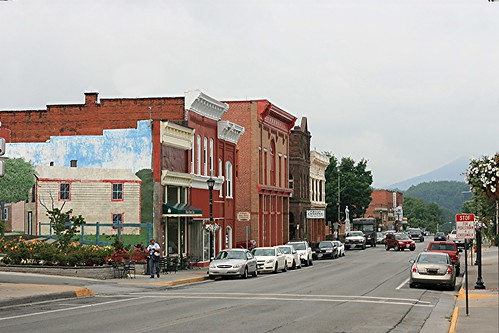Though some of our politicians might disagree, we know Appalachia is more than just coal, and we know Appalachians can do more than mine it.  Coal is important, it’s history and heritage, it’s provided a purpose and a living for thousands through the decades, but its days are dwindling and no number of EPA permits will make our coal competitive with the price of Wyoming coal or Illinois basin coal or natural gas. There’s an old saying, “Adapt or die,” and at the Appalachia’s Bright Future conference, we heard about different communities that either heeded or ignored that adage when their dominant industry fell on hard times. The Daily Yonder today featured an excellent report on the conference and the important lessons to be gleaned from other regions. Take the example of the fisheries in Newfoundland, closed by the Canadian government after being rampantly overfished:
Coal is important, it’s history and heritage, it’s provided a purpose and a living for thousands through the decades, but its days are dwindling and no number of EPA permits will make our coal competitive with the price of Wyoming coal or Illinois basin coal or natural gas. There’s an old saying, “Adapt or die,” and at the Appalachia’s Bright Future conference, we heard about different communities that either heeded or ignored that adage when their dominant industry fell on hard times. The Daily Yonder today featured an excellent report on the conference and the important lessons to be gleaned from other regions. Take the example of the fisheries in Newfoundland, closed by the Canadian government after being rampantly overfished:
“The way coal companies are treating retirees now [in Appalachia] sure sounds familiar,” [Brendan] Smith [a former cod fisherman] says. He notes that these industries don’t understand the nature of work—or what work meant to these fishermen. “Without jobs, they gave us checks. Money is great, I love money. But we lost our purpose. We would spend that check to buy a brand new beautiful truck, and we’d drink ourselves to death while wishing we were out on the boat.”After the cod industry collapsed, people found replacement jobs. They had a job at a call center selling seatbelts for pets. “The jobs they are offering suck,” says Smith. A proud fisherman doesn’t want to have to sell pet accessories to rich people, and a proud community—one that fueled the entire nation—doesn’t want to work over-the-counter jobs. They think they are worth more. They think their communities are worth more. “We need jobs that allow us not only to feed our families, but also to feed our souls.”
She says that having such a place give people a sense of pride. “[It] creates a locally rooted space where people from here…are producing and sharing and appreciating art or music in the same context as other, off-er, more urban places, cultivating the idea that we are just as good as anywhere else. I think this is rooted in some pretty problematic identity issues and internalized hillbilly oppression, but I really do think that’s one of the ways that it brings energy and power to our community.” One of the tangible results of an artistic community is that the city of Whitesburg has become a destination for people in surrounding counties and states. “I used to leave every weekend,” Kirby says. “Now I can’t pry myself away.”





